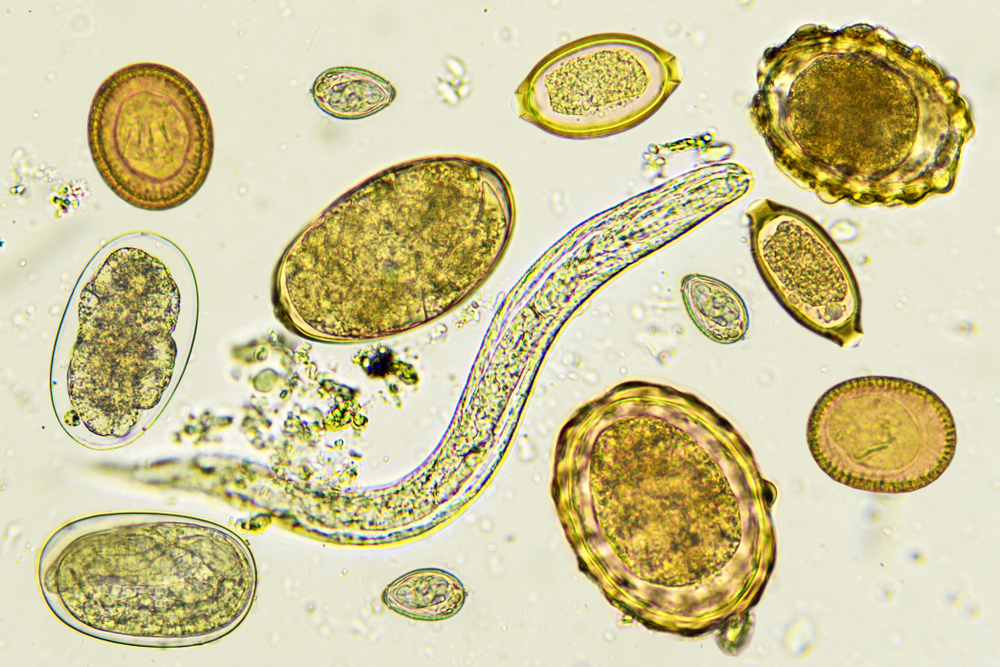Tuesdays with Tony
This week, let’s talk worms. I should have done this topic for Halloween. Worms are creepy, crawly, icky, and you humans hate to even think about your horse having a single one of them. A huge motivation for this week’s topic comes from this article I saw in one of the Doc’s science magazines: Importation of macrocyclic lactone resistant cyathostomins on a US thoroughbred farm. That’s a fancy way to say they found strongyles on a farm in Kentucky that weren’t killed by Ivermectin, and, even scarier, the parasites came in horses imported from Ireland. To keep your horse safe, this week we go from Mythbusting to Proper Parasite Procedure: Wisdom of Worms by Tony the Clinic Cat.
The Worms
Let’s talk parasites. The biggies we worry about in horses are large strongyles, small strongyles, ascarids, bots, pinworms, and tapeworms. Sure, there are others, but these are the ones that cause problems, and formulating a plan for these takes care of all those others. I’m talking to you, neck threadworm. I hear all kinds of craziness about the neck threadworm.
Know what kills neck threadworms? Ivermectin. And it kills them really effectively with ZERO documentation of resistance. This will be the end of my neck threadworm soapbox. Moving on to other soapboxes…..Large strongyles, bots, and tapeworms take a long time (in worm time anyway) to have babies. This means strategically deworming once yearly takes care of all your deworming needs here. It also means it’s really hard for them to develop resistance to drugs. Ascarids are mainly a young horse issue so skip to the babies section if you want to learn about them.
Pinworms are super annoying, and are generally addressed only when they’re an issue. Short answer for them: call my Docs if your horse is itching their tail. That leaves small strongyles. We base most of our deworming program on these guys.
Deworm all the time: MYTH
Every time the farrier comes. Every month. Once then again in two weeks, then again in two weeks. These are just a few of the very wrong deworming schedules I hear from my throne at the front desk.
Rotate different dewormers. Give Ivermectin all the time. PowerPac every horse. Give them Strongid, then Ivermectin. These are just a few of the wrong deworming drug scenarios I hear from that same throne.
What’s the correct answer? Fecal Egg Counts. This is how you tell what parasites are having fun in your horse’s GI tract, and how many of them are in there partying down. My Docs recommend every new-to-you horse gets a fecal egg count before deworming, and that every single horse gets a fecal egg count in the Spring. Using this fecal egg count, my Docs will then put your horse in the low, medium, or high shedder category.
Around 85% of the horses at Springhill Equine are low shedders!! That’s a lot of horses who don’t have a lot of worms. And our goal is to let those low shedders keep some of their worms. That’s right. We want some horses to have some worms. Low shedders have an immune system that keeps those worm numbers down, which lets us have a population of parasites that don’t get exposed to a lot of drugs. When this group mates with a strongyle that has resistance, the babies come out without resistance. The Docs even have a fancy term for this: Refugia.
Deworm the Right horse at the Right time!
“Ok Mr. Smarty Cat,” you say, “what am I supposed to do now?” As Mr. Smarty Cat I, of course, have an answer. If your horse is a low shedder, you deworm once a year, in the Fall, with a combination Ivermectin and Praziquantel product. The two brand names in the US are Equimax and Zimectrin Gold. Word of caution about Zimectrin Gold: some horses react very strongly to the carrier, so my Docs recommend Equimax. Why Fall? Because that’s when worms are old. By deworming them when they’re old and frail the drugs can kill more worms with less effort.
If your horse comes up as a medium or high shedder on that fecal egg count, they’re going to get dewormed in the Spring, and maybe again in Winter. That’s a call for my awesome Docs. That will most likely be with a plain ol’ Ivermectin. It will not be 5 days in a row, once with this drug, then wait two weeks and go with a different drug. It will be once with an Ivermectin. In 10-14 days after that ivermectin, a fecal egg count should be checked again. Why? Because I said so. And also because there has been documented resistance to Every.Single.Drug available to deworm horses. By checking that fecal egg count in 10-14 days, you can be sure Ivermectin is still working on your farm. It’s cheap insurance. That way you don’t end up like the super fancy Kentucky thoroughbred farm with very drug-resistant parasites.
Babies
Now, babies are different. Babies should be dewormed at 90 days of age with either pyrantel, fenbendazole, or oxibendazole. There are some reasons to pick one drug over the other for some farms so I HIGHLY recommend talking with one of my Docs before you start down this road. Babies are most susceptible to a class of parasites called ascarids. These guys love, love, love to learn how to survive any dewormer thrown at them. That means we have to be super careful with deworming programs for them to make sure we don’t help them learn all about dewormers. The good news is nearly all horses develop natural immunity to ascarids by about 12-18 months old. Fecal egg counts are super important for managing these guys!! You definitely want to talk with my Docs about that for your babies.
It all sounds complicated, but the answer is quite simple: bring poop to the Clinic. Start with a fecal egg count. From there my Docs will formulate a custom plan for your horse, and your farm. That plan will help you have happy, healthy horses for years to come!
Until next week,
~Tony
Want even more wisdom? Check out all my other blogs. I’ve been doing this for a very long time. You can also listen to the humans on something called a podcast. You can listen right here on my website, or subscribe to Straight From the Horse Doctor’s Mouth wherever you get your podcasts.
Tuesdays with Tony is the official blog of Tony the Clinic Cat at Springhill Equine Veterinary Clinic in Newberry, Florida. If you liked this blog, please subscribe below, and share it with your friends on social media! For more information, please call us at (352) 472-1620, visit our website at SpringhillEquine.com, or follow us on Facebook!
[jetpack_subscription_form title="Subscribe to Whinny's Wisdoms"]


